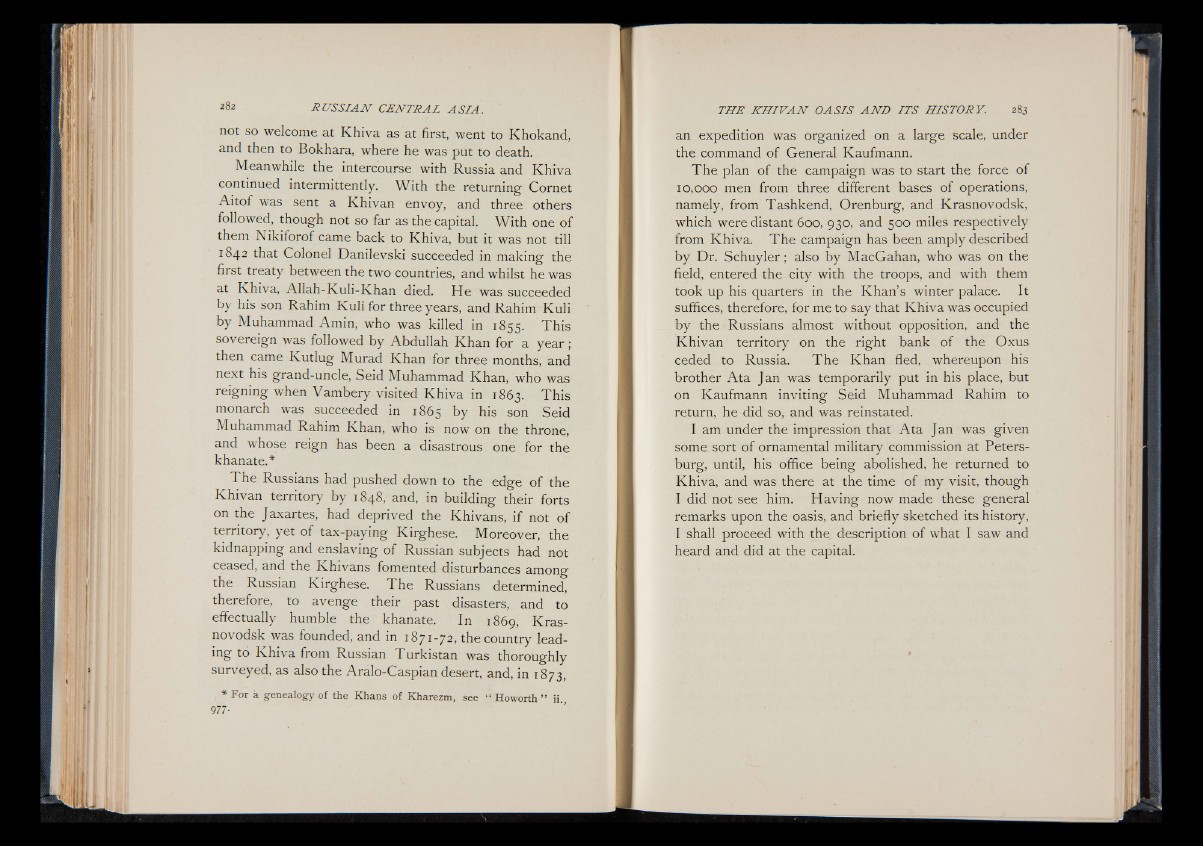
not so welcome at Khiva as at first, went to Khokand,
and then to Bokhara, where he was put to death.
Meanwhile the intercourse with Russia and Khiva
continued intermittently. With the returning Cornet
A ito f was sent a Khivan envoy, and three others
followed, though not so far as the capital. With one of
them Nikiforof came back to Khiva, but it was not till
1842 that Colonel Danilevski succeeded in making the
first treaty between the two countries, and whilst he was
at Khiva, Allah-Kuli-Khan died. He was succeeded
by his son Rahim Kuli for three years, and Rahim Kuli
by Muhammad Amin, who was killed in 1855. This
sovereign was followed by Abdullah Khan for a y e a r ;
then came Kutlug Murad Khan for three months, and
next his grand-uncle, Seid Muhammad Khan, who was
reigning when Vambery visited Khiva in 1863. This
monarch was succeeded in 1865 by his son Seid
Muhammad Rahim Khan, who is now on the throne,
and whose reign has been a disastrous one for the
khanate.*
T he Russians had pushed down to the edge o f the
Khivan territory by 1848, and, in building their forts
on the Jaxartes, had deprived the Khivans, if not of
territory, yet o f tax-paying Kirghese. Moreover, the
kidnapping and enslaving o f Russian subjects had not
ceased, and the Khivans fomented disturbances among
the Russian Kirghese. T he Russians determined,
therefore, to avenge their past disasters, and to
effectually humble the khanate. In 1869, Kras-
novodsk was founded, and in 1871-72, the country leading
to Khiva from Russian Turkistan was thoroughly
surveyed, as also the Aralo-Caspian desert, and, in 1873,
* For a genealogy of the Khans of Kharezm, see “ Howorth ” ii.,
977-
an expedition was organized on a large scale, under
the command of General Kaufmann.
The plan of the campaign was to start the force of
10,000 men from three different bases of operations,
namely, from Tashkend, Orenburg, and Krasnovodsk,
which were distant 600, 930, and 500 miles respectively
from Khiva. T h e campaign has been amply described
by Dr. Schuyler; also by MacGahan, who was on the
field, entered the city with the troops, and with them
took up his quarters in the Khan’s winter palace. It
suffices, therefore, for me to say that Khiva was occupied
by the Russians almost without opposition, and the
Khivan territory on the right bank of the Oxus
ceded to Russia. T h e Khan fled, whereupon his
brother Ata Jan was temporarily put in his place, but
on Kaufmann inviting Seid Muhammad Rahim to
return, he did so, and was reinstated.
I am under the impression that Ata Jan was given
some sort of ornamental military commission at Petersburg,
until, his office being abolished, he returned to
Khiva, and was there at the time of my visit, though
I did not see him. Having now made these general
remarks upon the oasis, and briefly sketched its history,
I shall proceed with the, description of what I saw and
heard and did at the capital.